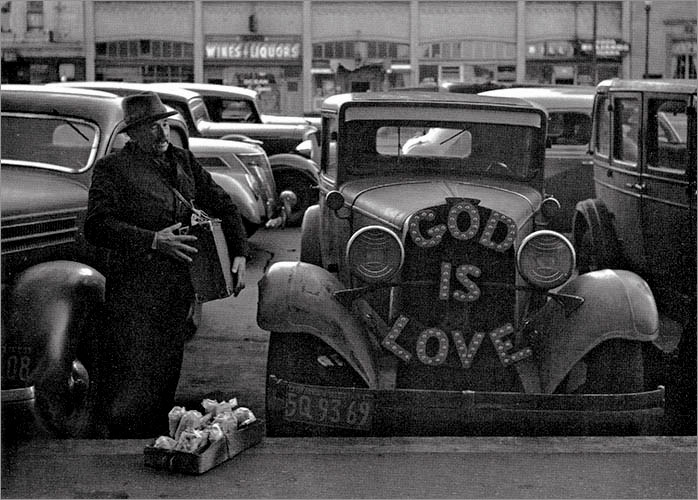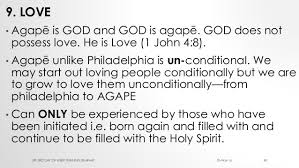LOVE (What’s It?) part one

It does not find its true delineation in the realm of emotionalism. No doubt about the fact that emotion can be symptomatic of love, but is it not very well known medically that a symptom of tiredness does not necessarily serve as the diagnosis for malaria?
Our emotions are not stable. They do have the tendency to fizzle out at an advent of another experiential stage of existence. Emotions often becloud the good sense of true judgment of a prevailing issue. Feelings ride on the wings of volatility for prominence and survival. Your feelings cannot be wholly trusted.

Love is not a feeling per se. It is a state of being. Love, actually, is a Personage. In the book of 1John 4:8, it reads: “He that loveth not knoweth not God; for God is love”. The 19th verse: “We love him, because he first loved us.” ‘Loveth’, ‘love’ and ‘loved’ (verse 19) is the Greek agapaō (ag-ap-ah’-o): ‘to love (in a social or moral sense)’; it is the verb form of agapē. ‘Knoweth’ is ginōskō (ghin-oce’-ko) ‘to learn to know, come to know, get a knowledge of, perceive’; ‘to “know” (absolutely)’. ‘Love’ in verse eight is agapē (ag-ah’-pay): ‘brotherly love, affection, good will, love, benevolence; love feasts’. Agapē is a feminine noun, therefore, very productive. No one knew love until God showed it. The same love moved God to descend from His most highly exalted heaven to save the lost souls.

Love, no matter what!
The grammatical femininity of agapē is indicative of worship. Whatever receives veneration has become a husband, spiritually. Jesus, who receives worship, is espoused to the Church {Ephesians 1:22, “And hath put all things under his feet, and gave him to be the head over all things to the church”; Ephesians 5:25-32, where verse 25 reads: “Husbands, love your wives, even as Christ also loved the church, and gave himself for it”}. Nimrod has the appellation of Baal and one of the meanings of Baal is ‘husband’. Wherever you see the symbolism of the moon, crescent or the sun, know that it could be a replication of Baal worship. It should not surprise anyone that Diana worship involves libidinousness. Diana is the same person as Semiramis, the moon goddess wife of Nimrod, the Baal. Anyone who comes to Jehovah God with the agapē of Christ will be doing so with the role of a worshipping stance.

The word, ‘charity’ in 1Corinthians 13:1-13 is Agapē, where we see the credentials of love. Faith is so vital that without it none can receive anything from God. We even understand that faith is what God employed at creationism. Hope keeps our faith at the highest degree of its zeal but love is the greatest among the three: “And now abideth faith, hope, charity, these three; but the greatest of these is charity” [1Corinthians 13:13]. “And thou shalt love the Lord thy God with all thy heart, and with all thy soul, and with all thy mind, and with all thy strength: this is the first commandment” [Mark 12:30]. Love, unlike virtues like hope and faith, is all encompassing. It is the very essence of God. You show faith to exhibit God, but when you love you are God in disguise. It is for this reason esoteric cultism enjoins its initiated ones to cultivate the habit of philanthropy in order to balance the good with their evil deeds.

God is a Spirit. Love, truly expressed, must flow from Him. You cannot manifest genuine love unless it is energized by the Holy Spirit. Verse three of 1Corinthians 13:3-8 reads, “And though I bestow all my goods to feed the poor, and though I give my body to be burned, and have not charity, it profiteth me nothing.” Esoterically fueled philanthropy is an attempt in otiosity. Verse 4, “Charity suffereth long, and is kind; charity envieth not; charity vaunteth not itself, is not puffed up;” where ‘suffereth long’, makrothumeō (mak-roth-oo-meh’-o) means: ‘to be long spirited, that is, (objectively) forbearing or (subjectively) patient’. ‘Kind’ is chrēsteuomai (khraste-yoo’-om-ahee) ‘to show oneself useful, that is, act benevolently’. ‘Envieth’ is zēloō (dzay-lo’-o) ‘to have warmth of feeling for or against’; while ‘not’ oú (ou), is absolutely negative adverb no or not’. ‘Vaunteth’, perpereuomai (per-per-yoo’-om-ahee) Middle voice from πέρπερος perperos (braggart; perhaps by reduplication of the base of peran (per’-an) –which comes from– peirō (to “pierce”); through (as adverb or preposition), that is, across’.) means: ‘to boast’; ‘not’ is oú (ou). ‘Puffed up’, phusioō (foo-see-o’-o) means: ‘in the primary sense of blowing; to inflate, that is, (figuratively) make proud (haughty)’. (…to be concluded…)
Click here to read part two



Visits: 123



